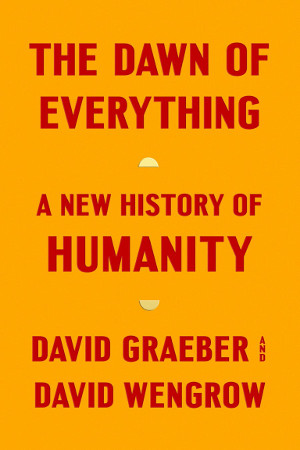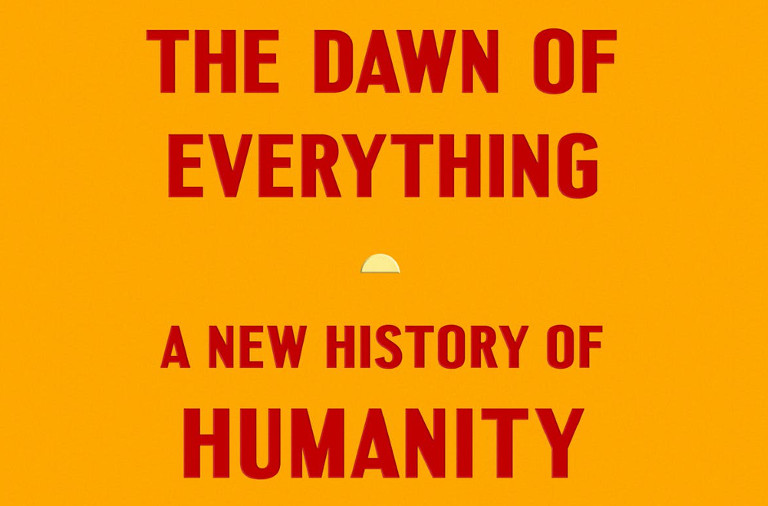 The Dawn of Everything was a revelation. The “Everything” from the title may not exactly refer to our past, but it surely may refer to a sweeping revision of how we see ourselves. If so, it could be a dawning for our species — if we survive the mess left over from our present dark night of the collective soul.
The Dawn of Everything was a revelation. The “Everything” from the title may not exactly refer to our past, but it surely may refer to a sweeping revision of how we see ourselves. If so, it could be a dawning for our species — if we survive the mess left over from our present dark night of the collective soul.
Reading Graeber and Wengrow confirmed what I hope are not just my own biases. But the thing is I don’t think you can fill 700 plus pages of well cited synthesis, representing thousands of hours of field work and research from around the world, with biases, mine or otherwise. It seems to me that the opposite is true. It takes an enormous amount of biased blindness to accept the official narrative of our species — especially for women, but maybe for just about anyone who is not a EuroWestern male. And it always has. High school history books in the US are object lessons in cognitive dissonance. Someone like me is left spluttering, “…but, but, but…reality! Where does that fit in!?!”
My first degree was in history. Granted, I was in a department that was consciously opposed to Western supremacy; we read Marija Gimbutas and Edward Said. But much of what Graeber and Wengrow rely upon was simply not in print when I was young. Not because researchers who leaned out into the real world were seen as all that original or radical. Certainly not rare. I went through school, relying on Xerox for huge piles of coursework “texts” (largely bound with rubber bands and twine…). But most of that work did not get published. While doctoral theses and field work overwhelmingly pointed away from the primacy of the West, what made it into print in scholarly journals and especially wider public distribution — like my high school history text and most of those still in use today — was almost exclusively more of the same “fall or progress of the great white male”. It took a fair degree of massaging to translate the stories found in research and real world evidence into this accepted narrative. The contortions that filled course books available in the 1980s were literally incredible, with vast swathes of time and geography reduced to footnotes. Well hidden and apologetic footnotes. If anything at all.
And this largely remains true today. Even in books that are not about the West. Read a book on “African” history. It will largely begin with the slave trade and colonization and will focus on those portions of time and place in this vast continent — the actual birthplace of our species! — that white people have found interesting, usually for their own economic reasons. I was an actual historian and yet was well into adulthood (and well out of college) before I ever encountered things like the Mali Empire and the Kingdom of Kush. (Which, by the by, overshadows Egypt by any metric, and in fact ruled Egypt in the 25th Dynasty, and yet is talked about in terms of adopting Egyptian customs. Still.) Of course, part of the problem is that books themselves are largely a EuroWestern thing. Cultural narratives were not written down in other cultures, they were memorized, and our bias toward the book belittled all these oral histories as subjective beliefs that could be altered with every telling — next to our own compilations of solidly objective facts in print. (Never mind that the print media exists because those facts keep getting altered… wouldn’t need more than one book if it actually contained the end all and be all of truth…)
I’m fairly certain Wengrow and Graeber have created a whole new revenue stream for publishers since their book thoroughly discounts much of what we accept as the factually printed story of humanity. To begin with they make it very clear that there is no one story. (Oooo… lots of new books in that!) Our species has been creating new ways of living in all the diverse ecosystems on this planet for hundreds of thousands of years. There isn’t going to be one narrative constant. Of course not! Why would there be? What works for Andean cultures is not going to be all that effective in the Sahara. Similarly, there is often much made of the invention of the wheel (somewhere near European peoples…) and the lack thereof in the Western Hemisphere. But have you seen the topography here? And where it’s not craggy mountains, it’s dense forest and wide rivers. Wheeled transport is just not going to work without a massive investment in flattening the terrain, which the locals did not see fit to do. (To say nothing of the attitudes embedded in actually moving the wheeled vehicle… which the locals also did not see as fit. Largely… ) No, if there is one recurring theme, it’s that we adapt to where we are in wholly novel ways and usually in ways that are so seamless as to be invisible. The growing of grain is the accepted ground state in EuroWestern outlooks, the natural progression of things human (whatever that means…) because we have embedded this toolkit into our culture so deeply as to make it indiscernible. It is so fundamental to our own story that we can’t see it without a good deal of effort (about 700 pages). We can’t see how unusual it is.
My favorite pet peeve has always been “the invention of agriculture”. As a child who grew up gardening and who learned from my father’s family of actual farmers, this label and the dismissive attitude embodied in these words made no sense except as yet another slur on farmers and farming. My first encounter with an alternative to this rather fixed load of crap was Nancy Makepeace Tanner, who surprisingly does not show up in Graeber and Wengrow (guess you can’t read everything). Tanner showed conclusively that intentional food production has always been a part of our species (probably predates our species), has largely been the purview of the females who were and are the caregivers of those who can’t feed themselves, and has been a very gradual process — to the point where it’s difficult to say this is agriculture and that is foraging. Moreover, it is the original science. Producing food takes enormous amounts of knowledge and experimentation. Still today. But Tanner was the first in my experience to point out that what we eat today was (and is) in no way edible in its naturally occurring state. That our ancestors, largely the women, had to not only invent ways to convince plants and animals to grow in ways that favor human consumption and then turn the resulting plant and animal fibers into digestible food, but they had to recognize that this was possible to begin with. It is not unlike considering tree bark as a nutritional option. (Which I’m sure it is, if we have any truly inventive people out there still… but then, that would kill trees… so maybe not…)
Wengrow and Graeber thoroughly quash the idea that all our methods of food production began in the Fertile Crescent at about the same time as they began building grain silos and housing complexes there. But really, should that have ever made sense? Is it not ridiculously ignorant to assume that agriculture is One Thing that can be invented in such a short time frame and in such a limited ecological niche? And maybe that is the most refreshing thing about this book — that it dispels all these webs of ignorance with frank (and funny) clarity. Of course women — who would not likely “be considered ‘white’ if [they] tried to immigrate to a European country today” — were the primary food producers. They still bloody are. Of course it takes a good deal of experimentation and knowledge to go from grass to grain to bread. And that’s just one thread in this tangled weave of inspiration and invention — and billions of hours of hard work, not all of which actually paid off in terms of caloric intake. Furthermore, they also make it quite clear that bread was not the only thing invented.
To make bread, you must also make pottery, ovens, water-tight storage, threshers, various cutting and digging tools, fire… You must have thrown out tons of nasty-smelling porridge sludge before thinking that “hey, maybe if I bake this…” You must of course have turned plants with tiny, indigestible seeds into grass with edible grains that stay attached to the plant. But you must have also invented ways to breed plants and propagate them before you decided to fix the grass problem. You must have a whole battery of tools and information at hand, very few of which would be obviously necessary to producing food — when you first made that cognitive leap to try to make grass into grain into bread. In other words, bread does not happen in a vacuum. Food production is embedded in local culture and ecology. Agriculture is culture and it is as varied as all the cultures humans have created to manage and live within their homelands.
Which is the main point of The Dawn of Everything. Humans are not stuck on one narrative path, especially this path that may be only that — a narrative, wholly divorced from evidence and experience. This affects everything, not just publishing or our navel-gazing obsessions with history. Graeber and Wengrow make it perfectly clear that there is nothing natural or inherent about any part of the EuroWestern narrative. They show that it is a small story that had a fairly brief run of wide success (supported by massive and unprecedented amounts of resource and labor inputs that have pretty much exhausted the entire planet and thereby ended the brief run of success…) This means that every seemingly solid thing that flows from that narrative — from conventional agriculture to hierarchies to the ethics and practicalities of care work — all melts into air.
We don’t need to be what the books say we are. Most humans aren’t that person now and never have been. We don’t need to be a part of this system that benefits nobody. There is nothing determined about our social structures or ways of meeting our needs (or… largely not…) We can embrace our “first freedom” and walk away like most humans have done throughout our existence. We might be able to move beyond being allowed to futilely pursue happiness and instead create ways of being that actually make us happy. Again. Because that is the prime message here: we have done all this before. We can do it again. We are not bound to the intangible whims of our forefathers. We can step into another dawning day and leave this darkness behind like the nightmare that it was. We can begin everything again.





